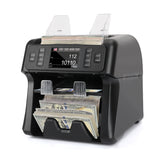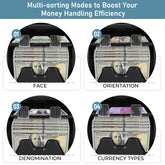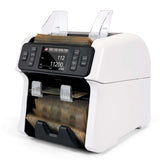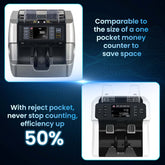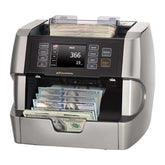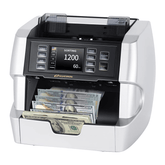How Counterfeit Money Can Ruin Your Business and How to Avoid It
Lately, fake bills have been popping up more often than weeds in a garden. According to the Secret Service, a whopping $167 million in counterfeit cash was seized in the US in 2020 alone, with the most common culprits being fake $20 and $100 bills. Accepting these bogus bills can easily result in a nasty economic and reputational blow for cash-based businesses like fast food joints and retail stores. In this article, we'll delve into the negative impact of fake bills on businesses, the importance of detecting them, and some tips on how to minimize the risk of accepting counterfeit cash.
What is Counterfeit Money?
Before discussing the negative impact of counterfeit money on businesses, let's briefly review what counterfeit money is. Many people think it is the same as the prop money used in movies, but it is not. Actually, counterfeit money is defined as currency that is produced and circulated without proper authorization. This type of currency is manufactured for the purpose of deceiving others. Nowadays, the most sophisticated counterfeit currency is called superdollar, which is almost identical to genuine currency and hardly be detected by most counterfeit detection devices.
How Counterfeit Money Can Hurt Your Business
Counterfeit money can cause significant damage to your business in three ways: financial losses, reputation damage, and legal consequences.
1. FINANCIAL LOSSES
Counterfeit money can cause significant financial losses for businesses. According to a report from the Secret Service, counterfeit money caused businesses losses of $14.7 million in 2022. When businesses unknowingly accept counterfeit money, they lose the value of the counterfeit money as well as the goods or services provided. Over time, these losses can accumulate and ultimately affect a business's profitability.
In addition, businesses need to incur extra costs to invest in counterfeit money detection equipment, such as UV lights or counterfeit detection pens. While these devices can accurately detect most counterfeit money, they are not capable of detecting more sophisticated counterfeit money, and their detection speed is very slow, requiring one-by-one inspection. In a way, this is also a financial loss in terms of time cost. Read more about why counterfeit pens are not a reliable way to detect fake money.
Moreover, accepting counterfeit money can lead to bank refusal to pay, even though businesses often do not know or detect the counterfeit money when accepting it. However, the professional bank note counters can quickly and accurately detect counterfeit money, and they will return it to the business that accepted it, and in some cases, charge the business fines or service fees, which is an additional financial loss.
2. Reputation Damage
Counterfeit money not only causes financial losses for businesses but also damages their reputation. When businesses unknowingly accept counterfeit money, it reflects poorly on their ability to accurately handle currency and prevent fraudulent activity. This can lead to a loss of trust and reputation among customers, suppliers, and other stakeholders, which is a very negative result. This loss of trust is difficult to regain, and it will have a long-term impact on a business's success. Additionally, customers may share their negative experiences on social media or through word of mouth, further damaging a business's reputation.
Furthermore, counterfeit money can also affect a business's ability to establish relationships with banks and financial institutions. Banks may hesitate to do business with companies that have a history of accepting counterfeit currency, making it difficult to obtain loans or process transactions.
3. LEGAL CONSEQUENCES
Under U.S. law, you may face certain legal consequences if you accept counterfeit money. However, these consequences typically depend on whether you were aware and whether appropriate preventive measures were taken.
No Evidence of Intent to Commit a Crime: If you unknowingly accept counterfeit money and there is no evidence that you intended to commit a crime, you will not be criminally liable. However, you will still be responsible for reporting the incident to the Secret Service or local law enforcement, and surrendering the counterfeit money. You will also lose the value of the counterfeit money, and may face civil liability if you pass it on to someone else.
Evidence of Intent to Commit a Crime: If you knowingly accept or use counterfeit money, or if there is evidence that you intended to commit a crime, such as having large amounts of counterfeit money or equipment for making it, you will be criminally liable. According to U.S. law, counterfeiting or using fake bills is a felony, punishable by up to 20 years in prison and a fine of up to $250,000. Therefore, you should avoid any involvement with counterfeit money, and report any suspicious activity to the authorities.
How to Avoid Counterfeit Money
-
No Evidence of Intent to Commit a Crime: If a business unknowingly accepts counterfeit money and there is no evidence that it intended to engage in such activity, the legal consequences may be relatively mild. In this case, the business may need to bear the loss as counterfeit money cannot be exchanged for real currency.
-
Considered Negligent: If a business fails to take sufficient measures to identify and prevent counterfeit money from entering, it may be considered negligent. This may result in relatively small fines and civil lawsuits.
-
Intentional Criminal Activity: If a business is found to intentionally accept or distribute counterfeit money, the legal consequences may be quite severe. This may include criminal charges such as forgery, fraud, and money laundering, and may result in hefty fines or even imprisonment.
-
Harm to Other Parties: Unknowingly accepting counterfeit money may also cause harm to other parties in the transaction. If customers or suppliers suffer financial losses due to the use of counterfeit money, they may file civil lawsuits seeking compensation. These lawsuits can cause significant damage to a business's reputation and legal fees, further exacerbating the financial impact of counterfeit currency.
As you can see, counterfeit money can ruin your business in many ways. Therefore, it is very important to detect and avoid it as much as possible. Here are some tips on how to minimize the risk of accepting counterfeit cash:
-
Train your staff on how to identify counterfeit money. You can use the official guides from the Secret Service or the Federal Reserve to educate your staff on the security features of genuine currency, such as watermarks, security threads, color-shifting ink, 3D security ribbons, etc… You can also test your staff’s knowledge by using real and fake bills as examples.
-
Use reliable counterfeit detection devices. You can invest in some devices that can help you detect counterfeit money quickly and accurately, such as money counters, currency discriminators, or bill validators. These devices can scan multiple bills at once and check for various security features, such as UV light, magnetic ink, infrared ink, etc… They can also sort and count the bills for you, saving you time and hassle. If you are considering purchasing a bill counter, you may find this article on key considerations when purchasing a bill counter helpful to make an informed decision.
-
Be vigilant and cautious. You should always be alert and careful when handling cash transactions, especially with large denominations or unfamiliar customers. You should check the bills for any signs of tampering or alteration, such as mismatched serial numbers, poor printing quality, different paper texture, etc… You should also use more than one method to verify the bills, such as looking at them under different light sources or feeling them with your fingers.
-
Report any counterfeit money incidents. If you encounter any counterfeit money, you should report it to the Secret Service or local law enforcement as soon as possible. You should not return the counterfeit money to the person who gave it to you, or try to pass it on to someone else. You should also keep a record of the incident, including the date, time, location, amount, description of the person who gave it to you, and any other relevant information.
CONCLUSION
Counterfeit money is a serious threat to your business that can cause financial losses, reputation damage, and legal consequences. Therefore, you should take proactive measures to detect and avoid it. By following the tips above, you can protect your business from counterfeit money and ensure its success.

